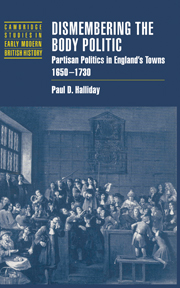Book contents
- Frontmatter
- Contents
- Preface
- List of abbreviations
- Part one Corporate ideal and partisan reality
- Part two The King and his corporations, 1660–1688
- Part three Partisan conflict and the law in a dynamic society
- 8 The legacy of the 1680s
- 9 Partisan conflict and political stability, 1702–1727
- 10 1660, 1688, 1727, and beyond
- Appendix A Royal charters of incorporation, 1660–1727
- Appendix B Enforcement of the Corporation Act, 1662–1663
- Select bibliography
- Index
- Titles in the series
9 - Partisan conflict and political stability, 1702–1727
Published online by Cambridge University Press: 10 November 2009
- Frontmatter
- Contents
- Preface
- List of abbreviations
- Part one Corporate ideal and partisan reality
- Part two The King and his corporations, 1660–1688
- Part three Partisan conflict and the law in a dynamic society
- 8 The legacy of the 1680s
- 9 Partisan conflict and political stability, 1702–1727
- 10 1660, 1688, 1727, and beyond
- Appendix A Royal charters of incorporation, 1660–1727
- Appendix B Enforcement of the Corporation Act, 1662–1663
- Select bibliography
- Index
- Titles in the series
Summary
Norwich's Mayor Anthony Parmenter could hold no meetings in 1717. “There were of the court of aldermen fourteen of that party or set of gentlemen who distinguish themselves by the name of tories or high Church men”; the ten others, Parmenter among them, were “reputed to be whigs.” The mayor summoned five meetings in quick succession, but the tories stayed away, denying him the quorum he needed to conduct business. As one opponent reminded him, when a whig had been mayor, the tories had kept him from convening any assemblies; Parmenter should expect to do no better. Though whigs were ascendant at Westminster, the coordinated action of the “high Church men” stymied the whig mayor of Norwich.
Then Thomas Bubbins, alderman of Mancroft ward, died. Parmenter now faced one less obstacle. Though he would still lack the quorum he needed even if his party gained the seat, the election represented an important opportunity and would be fought with that in mind. So one December night, jailer Peter Harrold moved Robert Beecroft from one end to the other of Norwich's prison. This made a voter of Beecroft. Long an inhabitant of Wymer ward, Beecroft became an inhabitant of Mancroft when he crossed the ward boundary that ran through the jail. Or so suggested his jailer. Beecroft had his doubts that so simple a move changed his official residence, but he went along. Arriving in the Mancroft side of the jail, Beecroft found over 100 men incarcerated in just the last few days.
- Type
- Chapter
- Information
- Dismembering the Body PoliticPartisan Politics in England's Towns, 1650–1730, pp. 304 - 341Publisher: Cambridge University PressPrint publication year: 1998



